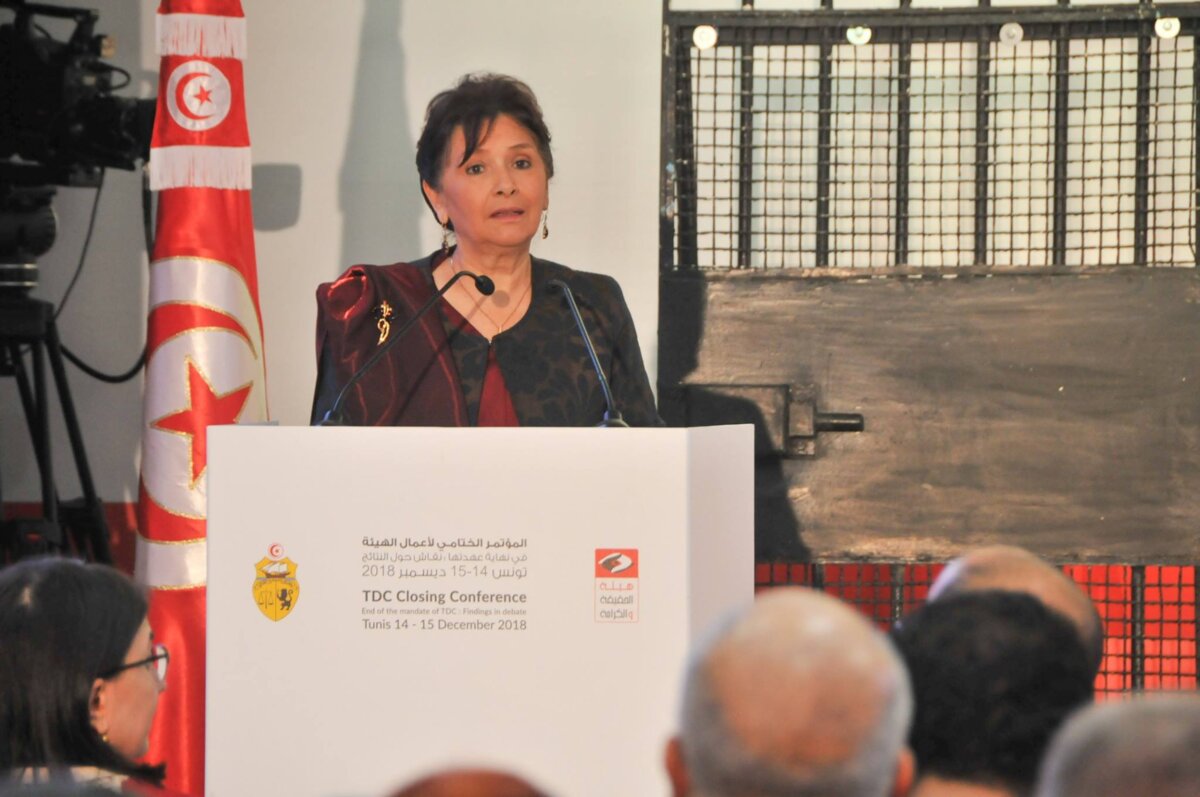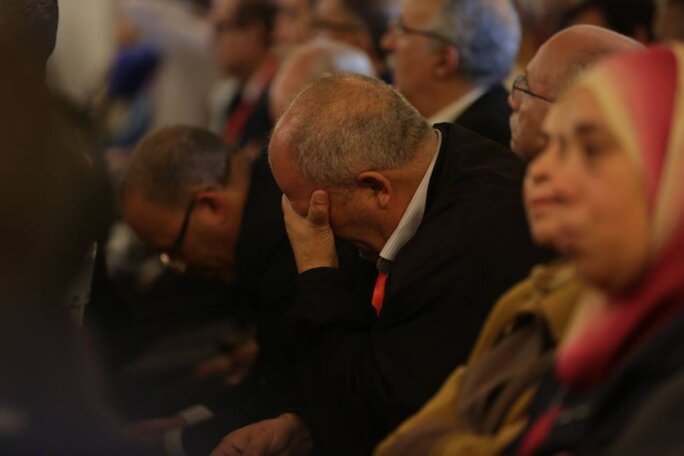“Welcome everyone, it's a shame that the three presidents – of the Republic, the government ad Parliament – are not with us today. It seems they are still reticent about applying the Constitution and implementing the reforms which are moving towards ending arbitrariness and corruption.” These words, spoken last month by Sihem Bensedrine, president of Tunisia's Instance Vérité et Dignité (IVD) or Truth and Dignity Commission, have a familiar ring to them.
Though she was speaking at a conference on December 14th and 15th to mark the end of the IVD's work, the absence of key state representatives came as little surprise. For the more than four years it has been in operation, no government or presidential representatives have attended its public hearings to hear at first hand the victims of the dictatorship under Tunisia's former strongman Zine El Abidine Ben Ali, who was forced from power in 2011 at the start of the so-called Arab Spring. Nor have they supported the work of the IVD, which was set up to tackle the abuses committed under the dictatorship and oversee compensation and rehabilitation for its many victims. As for the Tunisian Parliament, back in March 2018, 68 Members of Parliament voted against extending the life of the commission until December, even though this was necessary for it to complete its work.
“It's really a shame that they didn't come, at least for the end,” says Hayet Ouertani, president of the IVD's reparations and rehabilitation committee. “That has again created unease among the victims present and it also leads to doubt about the continuation of the process after the end of the IVD,” she says.

Enlargement : Illustration 1

Last month's two-day meeting of the IVD to discuss its achievements took place in a tense atmosphere. Outside there were some demonstrators who are still protesting against the process itself. At the debates inside inside the conference hall, meanwhile, some associations showed their unhappiness, raising questions on what would happen after the end of the IVD and arguing among themselves over where to erect memorials to ensure that the suffering under the dictatorship was not forgotten. “Where will the 50,000 IVD archive videos which document all the hearings go? Are we sure they won't fall into the wrong hands?” asked one representative of an association during a debate.
Ever since it was set up the IVD has been at the centre of controversy and has given rise to political tensions between those who favour the 'transitional justice' process and those who oppose it. Those political tensions have led to the commission and its work being demonized in the media. But as the IVD's members point out, its missions have indeed been fulfilled. It is now down to civic society to watch over the rest of the process and to the country's legal system which will oversee the process of specialist courts or tribunals set up to handle individual cases.
In the last four years a total of 62,716 cases have been put before the IVD and there have been 49,654 hearings. In a landmark moment for the country, more than a hundred cases have been sent to the specialist tribunals , leading to the first judicial proceedings on human rights violations committed under the dictatorship. “The victims' evidence, the proceedings but also the recognition of the violations, all that already represents a process of reconciliation,” says Hayet Ouertani.

Enlargement : Illustration 2

Yet the process has faced obstacles; many of the proceedings into offences committed during the dictatorship or during the revolution that followed have taken place without the accused being present. Sometimes the accused say they have not received a summons; others have simply boycotted the process.
The issue of financial reconciliation, based on a reparation fund of 10 million dinars (2.9 million euros) that is supposed to be provided by the Tunisian state, has also caused disagreements inside the Parliament's Assembly. During a vote on the budget in November 2018 some MPs called for the fund to be scrapped. This fund – known as Al-Karama or 'Dignity' – is supposed to cover ten thousand victims.
In addition the controversial law on administrative reconciliation, which was voted through in 2017, has allowed nearly 200 people to be discreetly granted an amnesty in circumstances which have been far from transparent. In all close to 7,000 people are potentially covered by this law which exempts people who found themselves caught up in the system of corruption under Ben Ali but who did not give orders themsleves and who did not personally benefit from the corrupt practices.
This process of administrative 'reconciliation', which was an initiative from the presidency itself, has caused controversy because it appears to short circuit the transitional justice process, in particular through the lack of transparency. Another problem is that the majority of the financial cases that the IVD were supposed to resolve in its arbitration committee – under which a business person who had committed embezzlement during the Ben Ali years could get a pardon by reimbursing the state – have simply not been brought to completion.
For the sheer number of disputes involving the state has clogged up the system. Today only four out of fifty cases are on the point of being resolved. One of those involves the well-known figure of Slim Chiboub, a businessman and son-in-law of Ben Ali. Two arbitration decisions have allowed more than four million dinars to be returned which should in theory go to the Dignity fund. But, once again, it is down to the state itself to take action to complete this process.
Lack of will by the state to guarantee 'transitional justice'
“The state could have reduced the tension around these cases. Instead, out of the 4,421 arbitration cases involving corruption, including 685 cases of financial corruption, that we have received, we have never had a response [from the state] other than a rejection,” said Khaled Krichi from the IVD's arbitration and reconciliation council.
In total, some 25,998 requests for arbitration, covering all forms of violation of rights, have been made to the IVD. The cases show that more than a quarter of the victims did not want to go to court but wanted to receive an apology and some form of compensation. “All these people, these civil servants and even the top leaders who have refused this form of reconciliation have missed an historic opportunity,” Khaled Krichi said during the conference last month.
The problems encountered by the IVD show that, beyond the issue of symbolic reconciliation, which also requires public apologies from the state to the victims, economic reconciliation is happening slowly or is being carried out behind closed doors in the corridors of power. On December 13th 2018, for example, the Tunisian government asked the European Union to unfreeze monies belonging to Marouane Mabrouk, a partner of the telecommunications group Orange Tunisie and a former son-in-law of Ben Ali.
“It's dreadful to see the head of the government, who symbolises the fight against corruption in Tunisia, asking the European Union to lift the freeze on Marouane Mabrouk's assets,” writes the Tunisian organisation I Watch in an article published on its website.
Meanwhile the presidency under President Beji Caid Essebsi created its own controversy when on December 10th it granted a presidential pardon to Borhen Bsaies. Bsaies, the strongman of the ruling Nidaa Tounes party and one-time propagandist for Ben Ali, had been sentenced to two years imprisonment in a case involving fictitious jobs. The former Ben Ali henchman did not hide how proud he was to have been freed and on Facebook he thanked everyone who had “taken part in his liberation”, in particular the president's son Hafedh Caïd Essebsi,who is executive director of the Nidaa Tounes party, and Nabil Karoui, director of the television station Nessma TV.
The post-IVD period as elections loom in Tunisia
This climate of special favours and a repudiation of the transitional justice process inevitably raises the question of what will happen now that the IVD has wrapped up its work. The commission planned to hand its final report over on December 25th to the president of the republic as well as the heads of government and Parliament, and under the law the government has to take account of its recommendations.
Salwa al-Gantri, head of the International Center for Transitional Justice's Tunisia office, says the Tunisian state has a real responsibility to continue the process started by the IVD. “After the handing over and publication of the report the state will have an obligation to respond, for if not transitional justice will simply be a cover argument to obtain foreign finance in the name of democratic transition,” she says.
As for the victims, the experience of transitional justice in other countries suggests that many will remain unsatisfied by the process. But for many victims what really matters is an apology from the Tunisian state and an acknowledgement of what happened by the state's institutions, rather than financial reparation.
“There's real concern about the process stopping. You could see that in the experiences of the compensation given to the martyrs and those wounded in the revolution [editor's note in 2011], the pecuniary issue doesn't change the need for justice and the acceptance of responsibility. Many families of victims are still demanding that today,” says Camille Henry, advocacy coordinator at the World Organisation Against Torture.
For example, during the two-day gathering of the IVD in December a judge apologised on behalf of the entire profession for the embezzlement that took place during some political legal proceedings under the dictatorship. As for the security forces – whose name has often cropped up during the IVD's proceedings – the issue of reconciliation has simply been brushed aside. Police unions have issued several statements denouncing the whole process and called for a boycott of the commission's proceedings.
Meanwhile, as the Parliamentary and presidential elections taking place at the end of 2019 grow closer, many associations warn of the risk of failure of the transitional justice process and of national reconciliation in general in Tunisia.
----------------------------------------------------------------------------
The French version of this article can be found here.
English version by Michael Streeter


